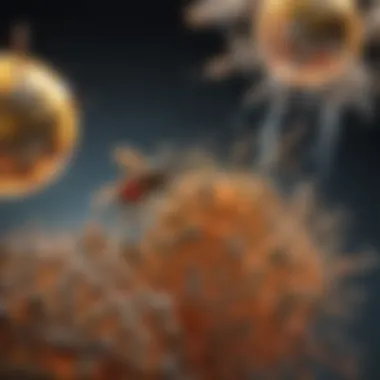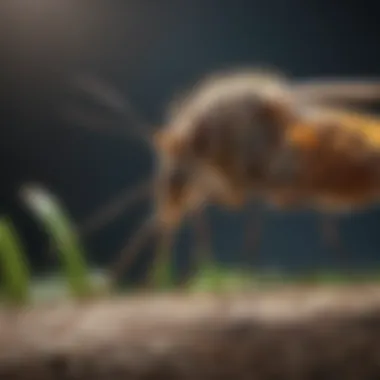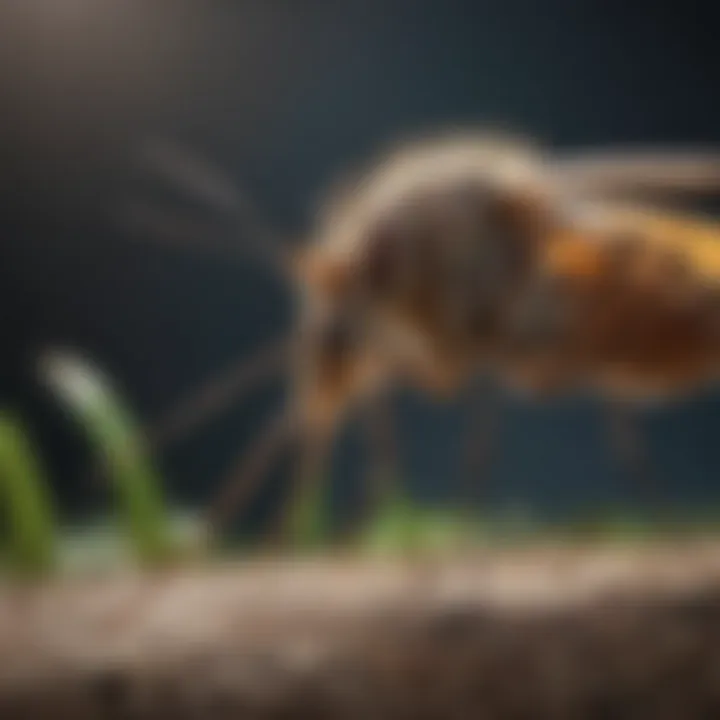Exploring Vitamin B's Impact on Mosquito Defense


Intro
Mosquitoes have ruffled more than a few feathers throughout history, and for good reason. They’re not just a nuisance; they can carry diseases that threaten human health. As people increasingly seek alternative ways to ward off these pesky insects, vitamin B has emerged as a potential player in the mosquito repellency game. This article digs deep into how vitamin B, through its various forms, influences mosquito behavior and may help keep these invaders at bay.
Understanding Vitamin B
Vitamin B isn't a singular entity; it comprises a family of water-soluble vitamins, each playing its own role in vital body functions. The most well-known forms, like B1 (thiamine), B6 (pyridoxine), and B12 (cobalamin), not only support metabolism but also bolster the immune system. While research on their direct ability to repel mosquitoes is still emerging, the speculation rests on whether increased vitamin B levels can cause a change in human skin odor, potentially making individuals less attractive to these insects.
Some folks liken the effect of vitamin B on mosquitoes to putting up a "Keep Out" sign. If they sense a human's presence as less appealing, they might just fly off to find a more enticing target. It's these subtleties that can lead to a rich exploration of the nuances surrounding vitamin B and mosquito interactions.
Exploring Mechanisms
The mechanisms by which vitamin B potentially impacts mosquitoes involve intricate biological interactions. These vitamins can affect body chemistry, presumably altering perspiration and possibly the scent emitted by human skin. Products high in thiamine, like whole grains and nuts, could lead to a notable difference if consumed regularly.
There’s a belief among some researchers that when vitamin B levels peak in the body, the release of specific natural compounds may become more pronounced, leading to increased resistance against mosquito bites. However, it’s crucial to realize that these claims aren’t universally accepted and remain a topic ripe for further research.
"While the potential for vitamin B as a mosquito repellent is intriguing, it's essential to approach it with a balanced view of other preventive measures."
Practical Applications
Given the context, how might one incorporate vitamin B into their daily regimen for enhanced mosquito protection? Here are some practical ideas:
- Dietary Changes: Incorporating more vitamin B-rich foods into meals can be a first step. Foods like lentils, fish, poultry, and leafy greens not only nourish the body but could potentially impact mosquito attraction.
- Supplements: Some individuals may explore vitamin B supplements as a convenient method to boost intake. It's worth consulting healthcare professionals before doing so, as overconsumption can have adverse effects.
- Topical Applications: While a common approach is to use topical repellents, integrating products containing vitamin B into personal care routines might also be a consideration.
Closures
In sum, the interactions between vitamin B and mosquito behavior present a fascinating area of exploration. While the idea of using vitamin B as a repellent is appealing, it’s imperative to rely on comprehensive mosquito control strategies that include both dietary and environmental factors. The science is still catching up, but it's certainly an avenue that invites further inquiry, especially for outdoor enthusiasts, gardeners, and anyone keen on enjoying nature without the bite.
Through detailing these connections, we aim to illuminate how vitamin B could enhance our defenses against mosquito annoyance and promote a more enjoyable outdoor experience.
Preamble to Mosquito Attraction
Understanding why mosquitoes are drawn to certain individuals, locations, and environments plays a pivotal role in grasping how vitamin B might come into play as a potential repellent. Mosquitoes, with their uncanny ability to find us, are not just annoyances; they're vectors for diseases that can pose serious risks to health. By delving into the mechanisms that make certain people more appealing to these pests, we can find pathways to better protection and informed choices.
Understanding Why Mosquitoes Bite
Mosquitoes primarily rely on a cocktail of sensory cues to locate their next meal. To put it simply, they play a game of hide and seek, but with a heightened sense of smell. The carbon dioxide we exhale is like a neon sign in the dark, waving a flag that says, "Here I am!" But it’s not just that; they have a soft spot for body heat and sweat. When we exert ourselves or even just share a moment outside, our bodies emit lactic acid, uric acid, and ammonia—all of which work to beckon these little bloodsuckers.
Moreover, our individual body chemistry is unique. Some research has indicated that people with higher concentrations of certain chemicals on their skin are more attractive to mosquitoes. It’s like having a personal advertisement for mosquitoes in your natural scent. This yields a real variety in attraction; family gatherings might see some folks getting nibbled while others remain untouched.
Factors Influencing Mosquito Behavior
When it comes to factors influencing mosquito behavior, there's a smorgasbord of elements at play.
- Environmental Conditions: Temperature and humidity significantly affect mosquito activity. Warm, humid days often see a spike in their numbers.
- Color of Clothing: Believe it or not, the color you’re wearing can impact your mosquito appeal. Dark colors such as black and navy blue attract them, akin to moths to a flame. Wearing lighter hues can be a simple defense tactic.
- Strong Fragrances: Whether it’s perfume, scented lotion, or even certain laundry detergents, strong smells can either attract or repel mosquitoes. Something pleasant to us can be a dinner bell for them.
- Alcohol Consumption: Studies suggest that ethanol consumption can make one more appealing to mosquitoes. It’s like adding another layer of allure—it’s not just your body but your beverage of choice that could be drawing them in.
In summary, knowledge of what makes us targets can be the key to reducing mosquito bites and enhancing our outdoor experiences. The following sections will delve deeper into how substances like vitamin B may modify these dynamics and potentially serve as natural deterrents. Understanding the battle between humans and mosquitoes can lead to better preventive measures, and integrating vitamin B into our lifestyle might be one of the many strategies worth considering.
Vitamin B: An Overview
When discussing ways to fend off those pesky mosquitoes, one might not immediately think of vitamins. However, vitamin B plays a surprisingly significant role not just in human health but also in the realm of insect repellency. In this section, we’ll explore why understanding vitamin B is crucial for those seeking alternative methods to keep mosquitoes at bay.
Vitamin B encompasses a group of water-soluble vitamins that work harmoniously to support various bodily functions. Whether it’s energizing our metabolism or aiding in the production of red blood cells, its importance in maintaining overall health is undeniable. But a less discussed benefit is its potential impact on mosquito behavior. This intersection of nutrition and pest deterrence is not merely interesting; it paves the way for practical applications for individuals looking to enjoy outdoor activities without being a buffet for insects.
The importance of vitamin B can be seen in its various forms, including B1 (thiamine), B2 (riboflavin), B3 (niacin), B5 (pantothenic acid), B6 (pyridoxine), B7 (biotin), B9 (folate), and B12 (cobalamin). Each of these vitamins plays unique roles in bodily functions, but they also serve a common purpose of enhancing our health resilience, which might influence how we repel mosquitoes.
The Importance of B Vitamins in Human Health


B vitamins are essential to everyone, acting as key players in fundamental bodily processes. For instance, vitamin B1 helps in converting nutrients into energy, while B12 is vital for neurological function and the formation of DNA. A deficiency in any of these vitamins can lead to various health issues, from fatigue to neurological disorders. Thus, ensuring that we have adequate B vitamin intake is a matter of maintaining both our physical and mental wellbeing.
Moreover, there’s a significant link between our diets and the outcomes of mosquito bites. Some research suggests that higher levels of certain B vitamins in the body may alter the chemical signature emitted through our skin, making us less attractive to these bloodthirsty insects.
Types of Vitamin B and Their Functions
Each type of vitamin B has its unique set of functions:
- Vitamin B1 (Thiamine): Crucial for energy metabolism and nerve function.
- Vitamin B2 (Riboflavin): Plays a role in energy production and the metabolism of fats, drugs, and steroids.
- Vitamin B3 (Niacin): Supports DNA repair and reduces cholesterol levels.
- Vitamin B5 (Pantothenic Acid): Vital for synthesizing coenzyme A, which is essential for fatty acid metabolism.
- Vitamin B6 (Pyridoxine): Important for protein metabolism and the production of neurotransmitters.
- Vitamin B7 (Biotin): Facilitates the metabolism of fats and carbohydrates, crucial for healthy skin, hair, and nails.
- Vitamin B9 (Folate): Involved in DNA synthesis and repair; particularly important during periods of rapid growth.
- Vitamin B12 (Cobalamin): Essential for red blood cell formation and neurological function.
Ultimately, while these vitamins are often talked about in the context of human health, their lesser-known potential effects on mosquito attraction position them as a natural option to consider for protection against bites in settings such as gardens or outdoor gatherings.
"The versatility of vitamin B paints a clear picture; it's not just about the nutrients, but how they might serve dual roles — promoting health and perhaps giving us an edge in the battle against mosquitoes."
In summary, understanding the unique functions of various B vitamins offers insight into their importance beyond mere nutrition, potentially impacting how we engage with the natural world.
How Vitamin B Might Repel Mosquitoes
Understanding how vitamin B can potentially help in repelling mosquitoes is a key component of this exploration. Mosquitoes are notorious for ruining outdoor activities, and if there’s a natural approach to keeping them at bay, many would certainly want to know more about it. Vitamin B, which is not only essential for human health but also plays a role in influencing mosquito behavior, offers intriguing possibilities.
The Biological Mechanism Behind Repellency
The biological mechanisms through which vitamin B might repel mosquitoes are still being unraveled. One fundamental aspect is that certain B vitamins, such as B1 (thiamine), are believed to alter body odor. You see, everyone has a unique scent, influenced by factors like diet, metabolism, and even genetics. Mosquitoes have highly sensitive olfactory receptors that allow them to home in on humans by detecting body odors. If vitamin B alters this scent, it could result in making someone less appealing to these pests.
To delve a bit deeper, it's said that when thiamine is ingested in sufficient quantities, the body may produce a scent that is distinctly unappealing to mosquitoes. While the scientific community hasn't completely verified this, anecdotal evidence from various individuals suggests a notable difference when they regularly consume vitamin B. A few studies have even shown that dietary adjustments involving B vitamins could yield a reduction in mosquito bites.
Of course, the efficacy might vary from person to person. Factors such as individual skin chemistry, the concentration of vitamin B in the diet, and overall health can all play pivotal roles in how this mechanism works.
Research Studies Supporting the Hypothesis
Although there’s a wealth of anecdotal evidence promoting the use of vitamin B as a deterrent against mosquitoes, scientific research is crucial. Some studies have indeed attempted to shed light on this area, presenting mixed results. For instance, one study observed a decrease in mosquito attraction among persons who consumed supplements containing B1. The findings indicated that within a few days, participants reported fewer bites compared to their baseline levels. However, the results were not universal; some participants experienced little to no change in mosquito activity.
Additionally, another study looked at other B vitamins, such as B6 and B12, suggesting that they too may play a role, albeit to a lesser extent than B1. This research underscored the necessity to examine the combined effects of these vitamins thoroughly, as a synergistic approach could reveal more on how the complex interplay of these vitamins might enhance their repellency.
Though conflicting evidence exists, it's important to consider that vitamin B must be viewed as part of a holistic approach to pest management, rather than a standalone solution. There are other factors that can determine the presence of mosquitoes, including environmental conditions, time of day, and the individual’s behavior.
"Incorporating vitamin B into your daily regimen could potentially provide an added layer of protection against mosquitoes, especially for those who frequently engage in outdoor activities."
Practical Applications of Vitamin B
The topic of Practical Applications of Vitamin B dives deep into how individuals can leverage the potential advantages of this vitamin both internally and externally. Understanding it in the context of mosquito repellency offers not only personal benefits but also a sustainable option for people who prefer natural remedies.
Incorporating Vitamin B into Your Diet
What you consume can greatly impact your body's defenses. Vitamin B is not just one entity; it comprises a group of vitamins that serve different functions in your health. Notably, some variations, like B1 (Thiamine), B2 (Riboflavin), B3 (Niacin), B5 (Pantothenic acid), B6 (Pyridoxine), B7 (Biotin), B9 (Folate), and B12 (Cobalamin), all play a role in maintaining our bodily functions.
To truly harness the repellent qualities of these vitamins, focusing on a balanced diet is paramount. Foods rich in vitamin B include:
- Whole grains: Foods like oats and brown rice have an abundance of B vitamins.
- Meat and poultry: Chicken, turkey, and lean beef are excellent sources.
- Fish: Fish such as salmon and trout are rich not just in omega-3, but also B vitamins.
- Dairy products: Cheese and yogurt not only taste good but provide a good boost of B12.
- Legumes: Beans and lentils help incorporate plant-based options.
- Leafy greens: Spinach and kale are top contenders for those avoiding meat.
Getting a rich array of these foods in your diet may enhance your body’s overall resilience against mosquito bites.
Topical Applications: What Works?
While diet lays the groundwork, how you apply vitamins on the skin is equally important. Topical applications of Vitamin B offer potential protection against mosquitoes, though results can be variable. Many people wonder which methods might be the most effective.
Some options include:
- Vitamin B Lotion or Cream: Certain formulations may help repel mosquitoes when applied directly to the skin. Look for products that list B vitamins among the first few ingredients.
- DIY Mixes: A homemade spray combining B-complex vitamins with water can work, with many DIY enthusiasts claiming success. A simple recipe could involve:
- Using Supplements: Especially with B1 or B12, some folks have reported success when taken as oral supplements ahead of outdoor activities. However, the efficiency of tangible outcomes from this method can vary person-to-person.


- 1 cup of water
- 1 tablespoon of nutritional yeast (which contains B vitamins)
- 5 drops of a favorite essential oil like citronella for added fragrance and repel effect.
"The effectiveness of vitamin B as a repellent might not be foolproof, but gaining a few more bites— or avoiding the itchy aftermath— makes an effort worth trying."
Considering the practical applications of Vitamin B in daily life underscores its multifaceted nature. It is not simply about consuming it or applying it; rather, a holistic approach, inclusive of dietary habits and topical implementations, can create a greater shield against mosquito nuisances. This is particularly valuable for homeowners and gardeners who frequently spend time outdoors, where mosquitoes pose a persistent challenge.
Comparing Vitamin B to Conventional Repellents
Mosquito repellent methods range from household names like DEET to more natural alternatives, including vitamin B. This comparison serves to investigate the strengths and weaknesses of these differing approaches while providing insights for homeowners, party hosts, gardening enthusiasts, and more. It’s essential to understand the role of conventional repellents vis-à-vis vitamin B to fully appreciate the implications of their use in everyday life.
Efficacy of Chemical Repellents
Conventional repellents, mainly chemical ones, have been the staple in the struggle against mosquito bites. Their effectiveness can be chalked up to their chemical composition. For instance, DEET, the most widely used ingredient, essentially confuses mosquitoes. It masks the scents they use to locate humans, be it carbon dioxide or body odors.
Research reveals that chemical repellents are often extraordinarily effective, not only repelling mosquitoes but also preventing bites for hours on end, which is invaluable during outdoor gatherings or evening gardening. However, their use often comes with a set of considerations:
- Skin Irritation: Many people report irritation or rashes after applying heavy chemical repellents, leading some to seek alternatives.
- Environmental Impact: Studies indicate that chemical repellents can have negative effects on surrounding wildlife, raising concerns among ecologically minded users.
- Health Risks: There are ongoing debates about the long-term health impacts of repeated chemical exposure.
Undeniably, the efficacy of chemical repellents places them high atop the list of choices, but safety and comfort can sometimes tip the scales in favor of natural solutions.
Naturopathic Alternatives to Chemical Options
Natural alternatives have gained a spotlight, particularly among those looking for gentler solutions. One such alternative is vitamin B, which proponents argue could repel mosquitoes in a more organic manner. Though it may not stop a swarm dead in their tracks, vitamin B’s approach relies on enhancing the body’s own defenses.
There are several noteworthy points to consider when evaluating naturopathic options like vitamin B:
- Low Risk of Side Effects: Unlike chemical repellents, vitamin B tends to be well-tolerated with lesser side effects, making it a friendly option for sensitive individuals.
- Holistic Benefits: Beyond mosquito repellency, the B vitamins play various roles in boosting overall health, potentially leading to additional benefits for users.
- Sustained Use: For those frequently outdoors, incorporating vitamin B into the regular diet might offer a long-term and low-maintenance approach to pest control.
However, it is crucial to note that evidence supporting the effectiveness of vitamin B as a mosquito repellent is less robust than that for chemical alternatives. Most users may need to consider this and possibly use vitamin B in conjunction with other methods for maximum control.
"Natural repellents may not be one-size-fits-all, but their lower risk profiles can appeal to many consumers seeking less invasive solutions."
Limitations of Using Vitamin B as a Repellent
When delving into the world of mosquito repellents, the potential role of Vitamin B often sparks considerable interest. However, as we explore its applications, it’s vital to also recognize its limitations. Understanding these shortcomings not only enhances our grasp of what Vitamin B can achieve, but also provides clarity regarding its effectiveness compared to other repellents in various settings, particularly for those who largely engage in outdoor activities such as gardening and hosting events.
Potential Shortcomings in Efficacy
While there are some studies suggesting that higher levels of certain B vitamins could create an environment less inviting for mosquitoes, the efficacy of these vitamins remains debated.
- Variable Outcomes: The results from research studies can be quite varied. Some found a modest reduction in bites when participants took Vitamin B, while others showed no significant improvement. This inconsistency raises questions about the vitamin’s reliability as an alternative to more established repellents.
- Diminished Effects Over Time: Another point to consider is that the potential protective effect of Vitamin B may diminish after time. Continuous exposure to environmental conditions, such as heat and sweat, can lead to a rapid decrease in its effectiveness. Thus, someone spending hours outdoors might find they need to reapply supplements or change approaches altogether after a while.
- Type-Specific Responses: Different types of Vitamin B might yield various outcomes on mosquito attraction. For instance, while some people swear by Vitamin B1 (thiamine), there’s a lack of consensus on how universally effective it is. Factors such as individual body chemistry, the specific type of mosquito, and environmental context can affect overall results.
Regulatory Concerns and Safety Issues
As with any substance applied to the body, there are regulatory and safety considerations surrounding the use of Vitamin B as a mosquito repellent.
- Lack of Regulatory Oversight: Unlike many commercial mosquito repellents, which are often rigorously tested and regulated by health authorities, Vitamin B supplements do not have the same level of scrutiny. This lack of oversight could lead to questions about ingredient purity and overall product quality.
- Potential Allergic Reactions: Although Vitamin B is generally considered safe for most people, some individuals may experience allergic reactions. Rashes, itchiness, or other symptoms can occur, especially if larger quantifies are consumed than recommended.
"Natural does not always mean safe. Just because Vitamin B is a nutrient doesn't mean it's always harmless when used in unconventional ways."
- Incorporation in Certain Diets: Furthermore, individuals on specific diets or with certain health conditions should consult a healthcare professional before relying on Vitamin B as a repellent. Those with kidney issues, for example, may experience complications depending on the dosage they take.
Vitamin B in Outdoor Activities
When we step outside, we embrace nature in all its glory, but so do pesky mosquitoes. Understanding the role vitamin B plays in outdoor settings, especially in relation to mosquito behavior, is vital. It not only promotes personal comfort but could enhance our enjoyment during various activities like gardening or hosting gatherings.
One of the significant benefits of incorporating vitamin B into our outdoor routines is the natural defense it may offer against mosquitoes. By possibly altering how our body emits odors or through biochemical reactions in the skin, vitamin B could become a part of our personal protection arsenal. Many people look for alternatives to chemical repellents, especially in gardens and shared spaces, making this an appealing focus.
Gardening: A Practical Context for Usage


In the realm of gardening, engaging with our green spaces can be enthralling, albeit occasionally interrupted by mosquito annoyance. Research suggests that certain B vitamins, particularly B1 (thiamine), may naturally deter mosquitoes when consumed regularly. Some gardeners suggest that incorporating more vitamin B-rich foods could help reduce the likelihood of attracting mosquitoes, which can make the outdoor gardening experience more pleasant. However, it’s essential to understand that while these vitamins might assist, they aren’t a silver bullet.
Practical Tips for Gardeners:
- Dietary Integration: Incorporate foods rich in vitamin B like spinach, nuts, and whole grains into your meals.
- Topical Application: Some opt to use vitamin B sprays. However, the effectiveness can vary, so a little experimentation might be necessary.
- Timing and Placement: Water plants in the morning. Later in the day, standing water attracts mosquitoes.
Keeping a garden vibrant means it’s often close to nature, which opens us to mosquito encounters. Gardeners can embrace vitamin B as part of a holistic approach to pest management, elevating their gardening experiences while enjoying the benefits that vitamin B provides.
Hosting Outdoor Gatherings Responsibly
Outdoor gatherings serve as a fantastic way to connect and enjoy the fresh air. However, the presence of mosquitoes can turn a lovely evening into a bothersome occasion. Integrating vitamin B into your pre-event routines could create a more welcoming environment for your guests.
For hosts, planning is key. Here are several actions to consider:
- Food and Drink Choices: Serve vitamin B-rich snacks like sunflower seeds and whole grain crackers. A refreshing salad using leafy greens can also help. This not only contributes to the overall theme of health but also employs the potential benefits of vitamin B.
- Invitation Tips: Suggest that guests consider their vitamin B intake before attending. It might sound unique, but it’s worth a shot for a mosquito-free space.
- Natural Decor Ideas: Consider using plants that mosquitoes dislike, such as marigolds or citronella. They not only beautify the space but may act as a deterrent when combined with the dietary approaches.
“The balance between nature and comfort during outdoor events lies intricately in our choices.”
By thoughtfully addressing vitamin B intake and sharing insights about it with friends, hosts can enhance their outdoor gatherings, creating a more enjoyable atmosphere free from unwanted guests like mosquitoes.
Together, these considerations form a part of a broader strategy that can contribute to managing mosquito presence while enjoying the great outdoors.
Future Research Directions
As we delve into the promising world of vitamin B as an agent in mosquito repellency, it’s clear that future research directions bear significant potential. The intricacies of how various B vitamins can effectively affect mosquito behavior have yet to be completely unraveled. With the rise in interest for natural pest control methods, fostering comprehensive understanding is not just beneficial but essential. This research could pave the way for innovative approaches to protecting ourselves and our environments.
Investigating Long-Term Effects
Understanding the long-term effects of vitamin B on mosquito repellency is crucial. Interestingly, preliminary studies suggest that consistently high levels of certain B vitamins may alter an individual's body chemistry in a manner that mosquitoes find less appealing. However, the actual duration of this effectiveness is still shrouded in uncertainty.
- Questions remain about how long the protection lasts after dietary incorporation.
- Will the body adapt to high levels of vitamin B, in turn lessening its repellency?
A meticulous investigation into long-term effects could lead scientists to harvest data indicating optimal dosages and methods for sustained protection. As vitamins, like B6 and B12, have different functions, pinpointing their specific roles can only enhance this understanding.
"Research can unlock mysteries seen in nature, propelling us toward safer, more effective methods of pest deterrence."
Broader Implications for Pest Control
The implications of understanding vitamin B’s impact on mosquito behavior stretch far beyond individual protection. If vitamin B is proven effective in repelling mosquitoes, its application may have broader ramifications in pest control methodologies. This research might lead to:
- Enhanced Pest Control Products: Formulating new repellents with a natural composition can cater to those wary of chemical components in conventional repellents.
- Eco-Friendly Solutions: Developing vitamin-enriched environments that support fewer pests could assist in maintaining healthy ecosystems.
- Public Health Improvements: With diseases transmitted by mosquitoes on the rise globally, alternatives to chemical repellents could have substantial public health benefits.
As we navigate forward, the amalgamation of traditional practices and contemporary research on vitamin B could offer exemplary strategies for integrated pest management.
In summary, the scope for future inquiry surrounding vitamin B’s role in mosquito repellency is not merely a realm of curiosity; it is a vital area of exploration that could yield influential insights and encourage safer alternatives in pest control strategies.
Finale
Summarizing Key Insights
To recap, the discussion underscores the following key insights:
- Vitamin B Complex Types: Several B vitamins, especially B1 (thiamine) and B12, have been associated with a decrease in mosquito attraction. These vitamins are naturally found in various foods and can be integrated into daily diets easily.
- Biological Mechanisms: Research suggests that certain forms of vitamin B may act by altering skin odor when metabolized, thus making individuals less appealing to mosquitoes.
- Practical Uses: There's potential for using vitamin B in different contexts, especially for those who spend significant time outdoors, that can align with lifestyle choices without the negative side effects commonly associated with chemical repellents.
- Limitations and Research Gaps: While promising, the current evidence calling out the effectiveness of vitamin B may not be strong enough to fully replace traditional repellents. Further research is needed to elucidate its roles and explore its broader implications.
To incorporate vitamin B as a repellent strategy might seem unconventional, yet it resonates well in the emergent quest for sustainable pest control solutions.
Final Thoughts on Vitamin B Repellency
In closing, the conversation around vitamin B's role in mosquito repellency invites a fresh perspective. As homeowners, gardening enthusiasts, and party hosts venture into nature, the consideration of combining dietary elements with pest prevention tactics can enrich the experience. It's about blending knowledge with everyday life.
Whether choosing to supplement with vitamin B or simply making sure to include nutritional sources like leafy greens, legumes, and meats in your diet, each small effort adds up. Moreover, understanding that some factors affecting mosquito attraction may also include personal body scents and environmental conditions emphasizes the complexity of repulsion strategies.
In summary, the integration of vitamin B as a potential mosquito deterrent showcases a promising avenue for research and application, illustrating the interplay between human health and ecological balance.
As we think about the future, it’s key to maintain an open mind and a willingness to explore these alternate methods while still being cautious of the limitations outlined. Through continuous inquiry into the intersections of health and pest management, we can work towards not just relief from bites, but a more harmonious relationship with our environments.







